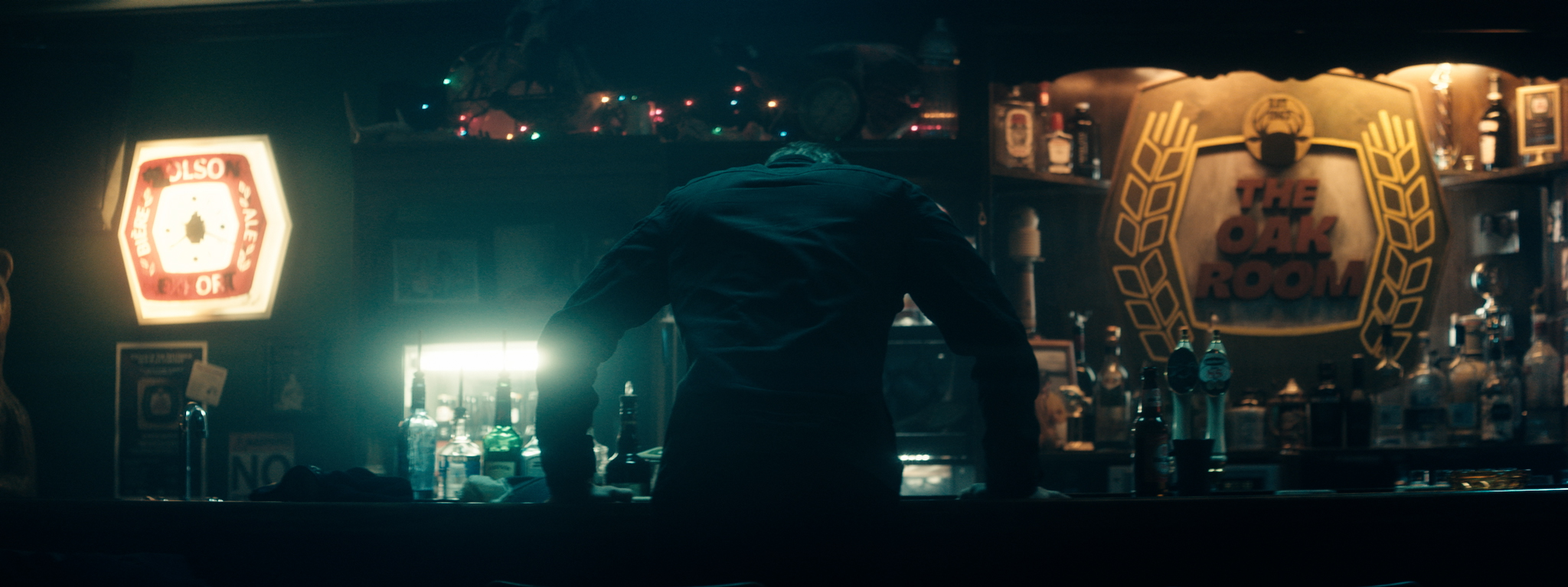
 The Oak Room, director Cody Calahan’s film from a script by Peter Genoway, is a very small movie with big results. The Canadian blue-collar noir features only five actors with any major dialogue, yet feels grander than the two bars in which it takes place.
The Oak Room, director Cody Calahan’s film from a script by Peter Genoway, is a very small movie with big results. The Canadian blue-collar noir features only five actors with any major dialogue, yet feels grander than the two bars in which it takes place.
“On a snowy night in a small Canadian town, Paul (Peter Outerbridge) has just closed up his bar when a young man named Steve (RJ Mitte) walks in the door — carrying a lot of baggage. The shared history between the two results in significant tension before Steve says he’s got a hell of a story to tell. It’s about another bar, The Oak Room, another snowy night, and another bartender visited after hours, this time by a stranger. There’s a story within that story as well… and as each mini-narrative unfolds, it brings Paul and Steve closer to a truth that will have severe and permanent consequences.”
Cinematographer Jeff Maher shoots the hell out of The Oak Room. From the opening shot, which pulls focus on a beer bottle sitting on a bartop while an attack takes place just behind the tone is immediately set for the film. Calahan wants you to pay attention to everything you see, because the words being spoken aren’t always 100% reliable.
As Paul says at one point, you gotta goose the truth a little to make for an interesting story, and every tale told over the course of the film’s taut 90 minutes has an element of that statement within it. Time and perspective are dubious, and everyone within the confines of Paul’s bar or the titular Oak Room has something hidden.
Stories are told out order, flashbacks happen within flashbacks, and at no point does The Oak Room ever feel like you’re standing on solid footing. Yet, for all of that, the performances are remarkably realistic. Sure, at times, it does feel like this might be a stage play — the dialogue is key, and given the preponderance of narration and monologues, you could stage this in any black box theater on the continent.

Thanks to lived-in feeling of Paul’s bar, this feels like a real place, and with Maher’s solid use of close-ups and framing, it’s like we’ve pulled up a seat at the bar with Paul and Steve to watch this all play out. Genoway’s script is neither wordy nor overly reliant on phrasing to make this sound more blue collar than it actually is.
The Oak Room sounds like people having conversations, and the pace and flow — which are paramount — measures out in a way that sounds like every frustrated conversation I’ve ever had. Words are cut off, pauses hang in the air with mystified, irritated glares, and at no point does expositional dialogue take hold. These are stories, not an effort to save money. So much of screenwriting is devoted to the idea of showing, not telling, but The Oak Room is rich with tales.
It might feel as though I’m being super vague in this review, and that’s kind of the point. The trailer for the film definitely presents a picture of the film from start to finish, and that’s really a shame. Cutting that sucker down to a tight minute would’ve preserved the mystery of how this film unspools. I’m really thankful I didn’t peek at it until right after I watched Calahan’s film, because this is a movie which works best knowing only the bare bones of the plot.

Just accept this: As Steve, R.J. Mitte is awkward and uncomfortable, but likable in a doofy kind of way. Outerbridge’s Paul feels like eight guys my dad grew up with and is still friends with — those weathered, small town guys who are tired of dealing with other people’s shit, yet always seem to find a way to manage through. Also, any fan of Orphan Black knows that Ari Millen is capable of inhabiting myriad characters, seemingly effortlessly, but it’s still startling to see him as just another fella when Michael first appears behind the Oak Room’s bar.
I’m not going to say any more. This is the kind of film I always hope to find at festivals, and Fantasia did a superb job in adding this film to their line up. The Oak Room is exactly what I love: something small, intimate, and mysterious that does so much with so little, and leaves me excited to share it with others. Check it out.




